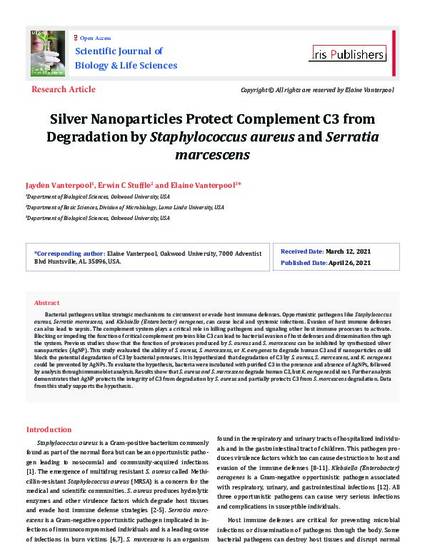
Article
Silver Nanoparticles Protect Complement C3 from Degradation by Staphylococcus aureus and Serratia marcescens
Scientific Journal of Biology & Life Sciences
(2021)
Abstract
Bacterial pathogens utilize strategic mechanisms to circumvent or evade host immune defenses. Opportunistic pathogens like Staphylococcus aureus, Serratia marcescens, and Klebsiella (Enterobacter) aerogenes, can cause local and systemic infections. Evasion of host immune defenses can also lead to sepsis. The complement system plays a critical role in killing pathogens and signaling other host immune processes to activate. Blocking or impeding the function of critical complement proteins like C3 can lead to bacterial evasion of host defenses and dissemination through the system. Previous studies show that the function of proteases produced by S. aureus and S. marcescens can be inhibited by synthesized silver nanoparticles (AgNP). This study evaluated the ability of S. aureus, S. marcescens, or K. aerogenes to degrade human C3 and if nanoparticles could block the potential degradation of C3 by bacterial proteases. It is hypothesized that degradation of C3 by S. aureus, S. marcescens, and K. aerogenes could be prevented by AgNPs. To evaluate the hypothesis, bacteria were incubated with purified C3 in the presence and absence of AgNPs, followed by analysis through immunoblot analysis. Results show that S. aureus and S. marcescens degrade human C3, but K. aerogenes did not. Further analysis demonstrates that AgNP protects the integrity of C3 from degradation by S. aureus and partially protects C3 from S. marcescens degradation. Data from this study supports the hypothesis.
Keywords
- Nanoparticles
Disciplines
Publication Date
2021
Citation Information
Elaine Vanterpool. "Silver Nanoparticles Protect Complement C3 from Degradation by Staphylococcus aureus and Serratia marcescens" Scientific Journal of Biology & Life Sciences (2021) Available at: http://works.bepress.com/elaine-vanterpool/3/
